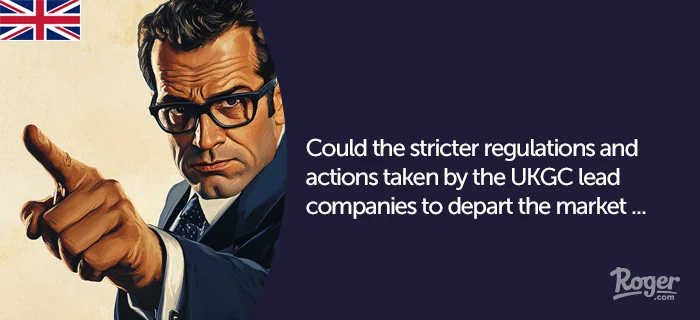Despite being one of the most trusted licences, there have been attempts to reform the UK gambling industry for several years.
? This year has seen the new Labour government begin to introduce measures (e.g., the £100m levy on gambling companies), with more to follow.
Despite this, the UK market remains one that overseas companies are keen to expand into. On the other hand, could the stricter regulations and actions taken by the UK Gambling Commission (UKGC) lead companies to depart the market? Let’s explore.
Table of contents
Stricter regulation and enforcement by the UK Gambling Commission
Stricter regulations have already had real consequences, as seen in the case of TGP Europe, which exited the UK market shortly after being fined £3.3 million by the UK Gambling Commission (UKGC).
The fine followed a UKGC investigation that uncovered multiple failings, including breaches of anti-money laundering regulations. Spreadex was also penalised, receiving a £2 million regulatory settlement, although it continues to operate legally within the UK.
These fines are among the most recent actions taken by the UK Gambling Commission, which has also been trialling stricter affordability checks on players.
Whilst these checks have faced criticism for being unpopular among operators and players alike, the Commission maintains that the goal is to implement them in a way that is as “frictionless” as possible.
Opportunities & challenges for gambling operators in the UK market
Still, there are new casinos that enter the UK gambling online market.
TaDa Gaming (known for live games like Golden Land) has recently been granted a licence by the UKGC to legally operate in the UK. This means their impressive portfolio of over 180 games will be available to online players in the UK for the first time.
Their CEO, Andy Huang, commented on the UKGC, noting that whilst other gaming authorities “rightly insist on rigorous standards and strict adherence to the rules, the UK’s Gambling Commission has the reputation for being the most demanding.”
We, therefore, see a situation in the UK where those companies who have been given licenses to legally operate know they will be penalised if falling out of line. That doesn’t just include regulatory settlements having to be paid but possibly losing their licenses.
Alongside the actions of the UKGC are the increasing amounts of regulation being introduced. 2023 saw the Conservative government publish a long-awaited White Paper on gambling reform. The document included many measures, mostly aimed at protecting young players and online casinos.
Labour was in opposition at the time but supported most of the White Paper’s contents. Betting and Gaming Council senior adviser Wes Himes says that the document was “rightly described as a ‘once in a generation’ reset for the sector.”
The impact of the Gambling White Paper and future reforms
This year has already seen a flurry of regulatory activity, including the introduction of a new statutory levy for licensed gambling companies in April.
? The levy is designed to raise £100 million annually, with the funds allocated to support research, prevention, and treatment (RPT) for gambling-related harm. Licensed operators are required to submit their payments to the UK Gambling Commission by 1 October.
Many who do suffer gambling harm talk about the problems they have faced playing online slot games. They are seen as being highly addictive, and this year has seen new maximum stake limits imposed on players.
The desire to protect younger players has been shown by the stake limit for those in the 18-24 age group, only being £2. For older players, it is now £5 per spin. The first three months of 2025 saw an online gross gambling yield of £1.45 billion. Of that amount, £689 million came from online slots.
Mr Himes has said that the new measure “will eliminate the previous regime of open-ended staking.” However, he added: “It should be noted that average stakes across the market are already less than £2 per spin.” Gambling responsibly is still vitally important for players.
How will the new maximum stake limits affect the gambling industry? An impact assessment by the government predicted that it would reduce operator GGY by £181 million. The BGC says that “we will know by autumn if that prediction is correct.”
How will players react?
The fear that the BGC has is how players will react to the stricter regulation. There is the possibility that they will decide to leave the regulated market: “It would be safe to predict a shift,” said Mr Himes, “but only time will tell how much.”
A shift toward the unregulated market would be a troubling development, as it offers significantly lower levels of customer protection and does not contribute gambling taxes on profits.
Such a shift could also negatively impact the revenue of licensed operators, further destabilising the regulated sector.
Changes in gambling advertising
Meanwhile, further regulatory action is being taken on how gambling companies market their products. New rules are also set to affect the bonuses offered to players, including a reduction in wagering requirements.
The Betting and Gaming Council (BGC) has stated that the government's White Paper is already “having a huge impact on the [gambling] market and will do so for years to come.”
With a potential reform of the gambling tax system on the horizon (possibly introducing higher tax rates) many operators are viewing the current climate as a deeply uncertain and challenging time for the UK market.
Looking to the future
Looking ahead, the UK gambling industry is facing significant changes with ongoing regulatory reforms and potential tax increases. Operators must adapt to stricter rules whilst striking a balance between player protection and market growth.
The coming years will be critical in shaping a safer, more sustainable gambling landscape for both players and businesses.





